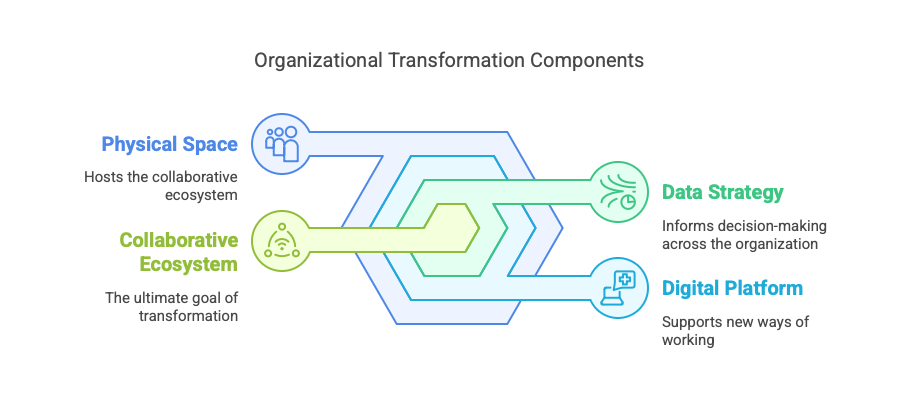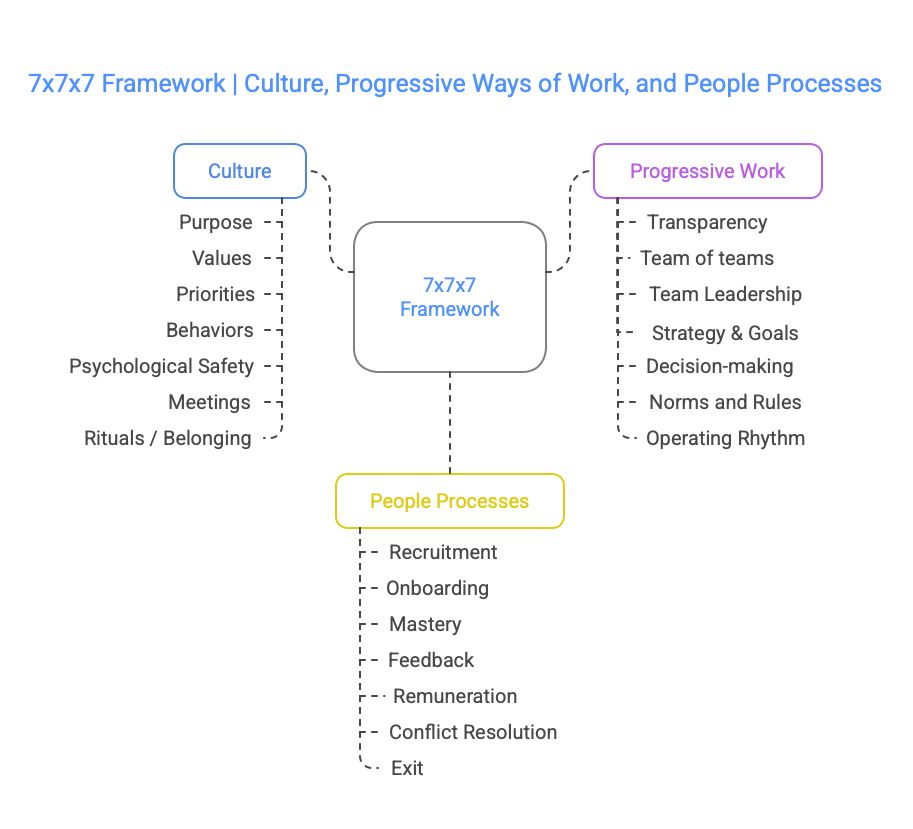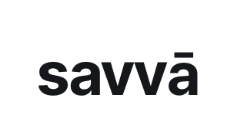Transformation Unscripted #4
Happy Friday!
As we wrap up the fourth month of our transformation journey, I'd like to share our progress, insights from our travels, and where we're headed next. Let's start with a quick recap of our Q1 achievements before diving into April's developments.
Q1 Recap: Building Foundations
Our first quarter laid the groundwork for this transformation journey. I delved into the organisation's structure and culture through dozens of meetings and workshops, introducing progressive principles to teams across multiple companies. The highlight was our March visit to four NER organisations in Bilbao, which helped us formalise our transformation goal:
creating a resilient organisation that can thrive for centuries regardless of circumstances by addressing transparency, decentralisation, and founder dependency
Italian Inspiration: RenDanHeYi Companies
April's highlight was our trip to Italy, where we connected with transformation experts and organisations implementing progressive organisational models. The experience was invaluable for understanding practical approaches to decentralisation.
The Companies & Experts We Met
Kopernikana | We spent an inspiring day with Francesco Frugiuele at his home that also doubles as Kopernikana's offices. The quality of conversation at Francesco's table was unmatched and fuelled my passion for better ways of work like few things can.
Chaordian | Emanuele Quintarelli provided insights on the structure of a potential transformation journey following the principles of the RenDanHeYi model developed by Haier. The entrepreneurial spirit and experimental approach of the transformations led by Emanuele seems to be exactly what we are looking for.
VAR Group: Led by Francesca Moriani, this IT services company is undergoing a significant transformation that goes a bit against the traditional issues in organisations of their size (4,000 and counting). As VAR Group grew through tens of M&A deals today they have team level autonomy, yet they are looking to tap into the collective potential and a singular offering to their clients. This go-to-market coordination across their wide service portfolio is at the core of their transformation.
Gruppo Asa: Their journey demonstrates how manufacturing companies can successfully implement decentralisation while maintaining operational excellence. One thing that stayed with me from the conversation with Michele Amati, their Sales and Marketing Director is the driver for their transformation - not only risks for the business that became evident after Covid-19, but also their understand that work can be different and more in line with the needs of people.
Gummy Industries: This creative agency embedded their own flavour in their transformation dividing teams into kitchens with different "menus" and offerings, brigades, a master chef and "mercato" offering shared services. In transformations towards decentralisation and removal of hierarchy, one of the central topics is always the role of the team lead - is their such a role, what the responsibilities and how do we make sure power is not abused. With this regard, Fabrizio, the founder of Gummy shared a very simple framework for keeping team leads / chefs in check: 1. is your PnL healthy; 2. is your team happy and 3. do you have a vision for your kitchen. Quite practical, right?
Every story was different, but all people we met agreed, that the path to decentralisation:
- Can be messy
- Takes significant time and energy
- Yet, every one of them would choose this path again
Why? Because of the impact they see on people, on the business, and on their own roles in the organisation.
Five key takeaways that particularly resonated with me:
- The Balance Between Decentralization and Centralization: The challenge lies in creating autonomous teams while preventing conflicts between individual team objectives and organizational goals.
- Pilots as Essential Guardrails: Starting with experiments helps identify what works (and can be scaled) versus what should be discarded. Pilots also allow for the introduction of changes that might otherwise face significant resistance.
- A Fundamental Mindset Shift: Success becomes less about hierarchical position (number of people in your team, access to information, etc.) and more about achieving meaningful outcomes. Value creation becomes laser-focused on customer needs, moving conversations from price to genuine problem-solving.
- People Transform Their Relationship with Work: Team members stop seeing themselves as mercenary talent and begin viewing the company as a platform where they can create value simultaneously for customers, the organization, and themselves.
- Language Signals the Tipping Point: You'll know the transformation is taking hold when you hear people naturally speaking in new terms, meaning they've digested the new concepts and are applying them in their context.
All in all, Italy was a great trip as it is also pointing to the approach we want to implement in our own transformation.
Building the Transformation Team
We're making significant progress in forming our transformation team. We are looking at all sides of the equation and aiming to address each one:
- the need for an experienced partner
- the need for a strong local team that can build on and deliver on the promise of the transformation across the entire ecosystem
- experts in bringing a new product to market and
- experts in collaboration, facilitation and mediation
To that end we are
- Finalising the scope of our collaboration with Emanuele Quintarelli, whose experience with similar transformations will be invaluable
- Scaling our collaboration with local partners specialised in product-market fit definition which would be invaluable for our pilots centerer around new products and services
- Bringing on coaches to facilitate team meetings, provide Sociocracy 3.0 training, and offer individual coaching
It's shaping up to be a great team supported internally by our people, marketing and finance functions. All is all, feels like we are building the ultimate decentralisation transformation team in Bulgaria and I cannot wait to be part of the impact it delivers - in the pilots now and at scale later.
The Bigger Picture
It's becoming increasingly clear that our organizational transformation is one piece of a larger puzzle with at least three more components:
- Physical Space: Designing our future collaborative space to host the ecosystem we're building
- Digital Platform: Developing the technology infrastructure to support our new ways of working
- Data Strategy: Leveraging data to inform decision-making across the organisation

While our primary focus remains on the organisational transformation, we're tracking use cases for these other components so we can begin building early next year.
Personally, for me the most challenging part is the digital platform as it has at least three non-trivial goals:
- providing a market place for internal talent and external partners
- collecting market insights from our customers and the larger industry
- settling value adjustment mechanism as per the RDHY methodology
If you've come across examples of any of these goals realised through a digital tool, please do not hesitate to share.
Transformation Framework: 7x7x7
As we sit down to agree what part of the transformation we tackle with the help of an external partner and what items remain as additional internal goals, I've been revisiting all frameworks and tools I've explored so far:
- the Reinventing Organisations Map by Frederic Laloux
- the 8 trends by Corporate Rebels
- the Operating System Canvas by Aaron Dignan
- New Work by Design by Manuel Kublock
- Sociocracy 3.0
- Culture Design Canvas by Gustavo Razzetti
Based on all of these and my own experience, I've compiled a sort of framework with 7 culture components, 7 progressive work design components and 7 people processes:

This 7x7x7 framework will serve as our transformation checklist, helping us assess current state, define desired future state, identify gaps, and plan actions for each component.
Self-Reflection
April felt like a wake-up call. I entered the organisation as a project lead with clarity about the principles we need to embody in a future-proofed organisation. However, it was only through these initial three to four months that clarity also emerged for the founder.
This exploration and learning, as well as the identification of an experienced external partner, are invaluable. In many ways, it feels as if we are only now starting the real work.
Coming Up in May
May promises to be equally exciting with:
- A workshop on setting the guardrails for the transformation with a select group of leaders from the organisation
- Planning workshops with three companies to decide what to pilot first
- An Ask Me Anything session that will give the floor for all sorts of questions from the entire team
It's going to be an exciting summer by all means!
Thank you for following along,
Svetla

Member discussion